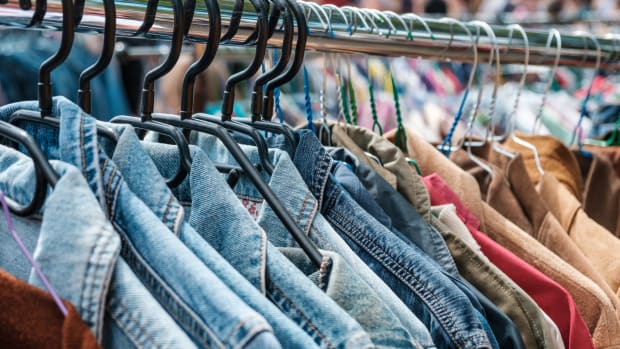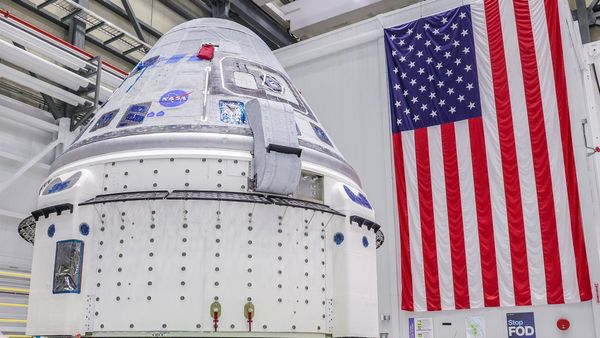A growing majority of consumers value sustainability when it comes to cracking their wallets. As we collectively engage in more conversations about the environment and our future with it, many major companies are searching for ways to appeal to the Earth-conscious consumer by reducing their own carbon footprints.
This consumer ideology has a lot to say about the textile industry, which accounts for an estimated 10% of carbon emissions around the world. In the United States, disposal of our old clothes adds up to about 81.5 pounds of clothing per person a year. And the majority of that ends its life in a landfill.
But recycling clothing isn't as simple as, say, recycling aluminum cans. In the era of greenwashing, it's hard to know if the things you're making an effort to recycle are actually making a real difference because most things we use are made up of lots of materials. Clothes are no exception.
Some businesses are quietly working behind the scenes to do something about the waste that the textile industry creates. One of those is Paragon Textiles, a textile recycler founded in 1992 that purchases overstock, returned, and damaged inventory and sends the wearable products to micro-entrepreneurs in developing countries.

Shutterstock
How Paragon Helps Big Businesses
For the last two years, corporate social responsibility manager Kay Litwin has been expanding the Paragon Textiles business into the world of major retail. Thanks to her initiative, the company is now purchasing overstocked and returned items from mega-brands like Amazon (AMZN), Costco (COST), JC Penney (JCPNQ) , and H&M (HNNMY) -- bulk stock that would otherwise be destroyed or thrown away.
Through its division company Samiyatex, Paragon redistributes millions of pounds of thrift-store overstock from shops like Goodwill (a long-time client of Samiyatex). Wearable items are sent to warehouses in Chile and Angola, Africa, where they're sorted by a staff of curators. There, entrepreneurs from developing communities sort through the inventory, shopping for items to sell in their own stores back home.
Of the millions of pounds of clothes and shoes donated, wearable items make up about 75% of what the company purchases. Another 20% isn't wearable, but will be sent to L.A.'s Rag House, where it will be used to make technical textile products for film productions. The remaining fabric with good threading is sent to a partner in India that deconstructs the thread. Maybe 1% of the clothing is left for the trash.
Another branch of the company is quite aptly named The Fundraising Company (TFC). Say an organization in your neighborhood is trying to raise funds. That organization can hold a shoe drive, collecting valuable resources for developing communities that need them. TFC will then buy all those shoes, giving the organization money for their upcoming project and directing the shoes to where they need to go.
Sometimes, curators stumble across discarded clothes that are actually an incredible fashion find. Those items go to L.A. Vintage, a company that sells vintage, designer, and boutique clothes in bulk. The 42,000 sq. ft. warehouse is available to independently-owned vintage sellers, who can come hand-select their bulk order of items or have a specialized order shipped to them.
Connecting with these giant companies and pitching this innovative new form of recycling isn't always easy, Litwin tells TheStreet. It's a game of persistence -- it means reaching out to companies by any means possible, like social media or LinkedIn. But as Kay and her team bring more retailers into the fold, they get paid to facilitate a positive change in the world.
Donation vs. Investment Models
What makes this business model so unique is its status as a for-profit company. Recycling clothing seems like it would fall into the realm of a 501(c)(3). Litwin tells TheStreet that the company's intention is to make an investment in these communities rather than making donations.
Donations may be well-intentioned, but without a sense of thoughtfulness, they can be highly problematic. For one, donations often aren't sorted with the care put in by Paragon Textile's clothing curators, meaning that donations can sometimes be unwearable items. Also, floods of donations can actually upend a community's already vulnerable economy -- which means that when the donations run dry, the infrastructure to keep providing goods and services has all dried up.
Instead, Paragon Textiles provides these entrepreneurs, who are most often women, with micro-loans to buy their first bundle of clothing. This creates opportunities for folks to start their own storefronts and work their way toward a sustainable financial independence.
The method seems to be working wonderfully. According to Litwin, the company has a 100% payback rate on these loans. It's also an investment in these communities' natural resources, since no new product is actually being created.
As more companies start to embrace a more eco-friendly attitude, even more innovative ways of reusing and recycling our merchandise will develop, too. For now, Litwin tells TheStreet that she's looking forward to more companies joining in on the do-good profit model that Paragon Textiles practices. In a world ready to normalize sustainability, finding green practices will be an ever-evolving project.







